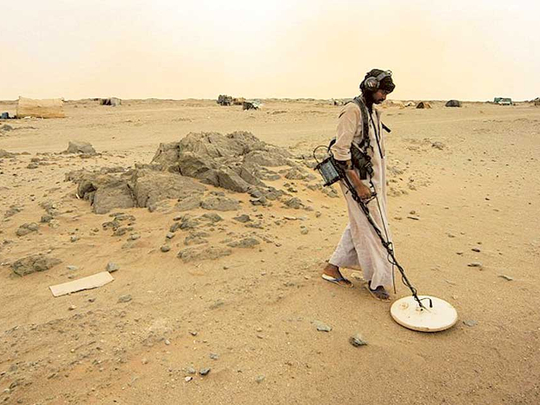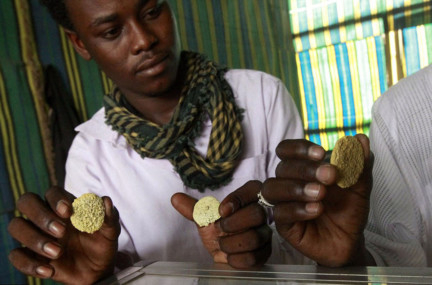
Abdulhadi’s rags-to-riches story is a reflection of how Sudan’s fate is turning, and the country’s future isn’t just bright, it’s gleaming golden. The 27-year-old, who holds a BA in business administration, was unemployed — until he struck gold, literally.
His fortune changed with a 5kg gold find in the desert of the Northern Nile state, and today he owns two companies — one in Khartoum and the other where he mines with excavation equipment worth $5.3 million (Dh19.5 million).
Sudan may have lost out on black gold with the secession of South Sudan in 2011 — according to the World Bank estimates, South Sudan got 75 per cent of the oil reserves, leading to a 60 per cent loss of national revenue for Sudan — but President Omar Al Bashir is unfazed. He had cheerily remarked: “We lost the oil, [but] we [have] got gold.” And apparently, there’s plenty of it.
Untapped reserves stand at more than 1,000 tonnes, with excavations unearthing more. The recent find by the Russian company Siberian added 50,000 tonnes in gold reserves, bringing in a healthy $1.702 trillion to the Sudanese treasury.
It’s hardly a surprise that a gold rush of sorts has begun in the country. People call gold their friend, a friend that can deliver the state a greater degree of economic power. Like Abdulhadi, there are others who are becoming millionaires overnight. Communities are getting richer and new towns and markets are mushrooming.
In 2009, Sudan produced a measly 4 tonnes of gold. In 2013, it produced 34 tonnes, which rose to about 70 tonnes the following year. Today, it is set to produce more than 82 tonnes according to government estimates. In the first half of 2015, it produced 54 tonnes, 90 per cent of which was by ordinary Sudanese and the rest by companies. The country is expected to produce more than 100 tonnes in 2016.
At present, Sudan ranks third in gold production in Africa, after South Africa and Ghana, and is likely to surpass them in 2018.
With about 800 sites estimated to contain gold, the mood in the country is upbeat, and rightly so. Even multinationals, including those from Russia, China, Europe and the United States, which had imposed sanctions on Sudan in 1997, have taken note.
All these countries are now eyeing Sudan as a “pot of gold”. Sudan has deep gold shafts up north past Khartoum, the Nubia desert, in conflict-ridden Darfur as well as its section of the Red Sea where Saudi Arabia, through its Atlantis project, is partnering with the Sudan Government for gold, silver, copper and zinc. Gold prospecting is presently carried out in Sudan’s 18 administratively divided states.
Former Sudanese Minerals Minister Abdelbaqi Al Jaylani wrote in 2010 that there was a “gold rush” in Sudan, somewhat like the one in the US in the 19th century. Some 200,000 poverty-stricken Sudanese people had become gold diggers, scouring the vast deserts, land and creeks in the hope of a better future.
It is estimated that more than a million Sudanese people are sifting the desert sands and digging mountains for that precious yellow metal, government measures and laws notwithstanding.
Among the gold prospectors are villagers, government employees and unemployed youngsters. And then there are those who quit their job to dig for gold. The lure of gold has also brought some of those who migrated abroad for jobs back to Sudan.
And there are success stories, too, despite the dangers, failure, and even death because of snake bites, scorpion stings, falling debris or mines collapsing. Sudan, a country of nearly 27 million, is basking in its new-found treasure.
Al Sadeq Al Qadi from Al Araqi village in north Sudan has become a legend of sorts in the country. He and his six friends scraped together $5,000 to buy a metal detector and rushed with gallons of water in a car to the hot, harsh desert to the western side of the country.
“Despite all the hardship, the lure of gold is irresistible,” he says. After 15 days of digging, when his group struck 18kg of pure gold, they broke into a dance of joy. They quickly took their treasure home and had a feast. “We gave some of the gold to the rest of the village.”
Amer Tabidi, whose family already has a jewellery shop in Khartoum, abandoned a life of comfort to look for gold in the desert infested with snakes and bandits. Along with a group of young men and with the help of metal detectors, he struck gold in the first two weeks of his expedition.
“It was only 2kg of gold which we sold at a good price,” Tabidi says, “but that only whetted our appetite. Since then, we have made the trip twice, with our group of young men wanting to become rich getting bigger each time.”
There’s another fallout of this gold rush — boom towns. It is reported that about 5 million people are offering support to the gold prospectors. Some are providing equipment and excavators to those who can’t afford to buy their own, while others are offering basic necessities such as water for those prospecting in the desert.
One story that is doing the rounds is of a man who’s sold so much water to the prospectors that he is doing better than many of them. “Why become a gold digger when I have all this gold,” he says, pointing to his bottles of water.
There are entire villages and towns that have flourished in this gold rush. One is the case of a village in the Halfa district in the north, whose population grew from a few thousand to 20,000 in no time. These are mostly people from other areas who migrated here.
And with growing population came problems of pressure on local amenities and crimes increasing. The erstwhile sleepy village, which usually had rich date harvests, changed completely. “Besides the stick-ups that happen on streets daily, there’s increasing theft of the date harvest. And then there’s the issue of sanitation and environment in a village that doesn’t have enough toilets,” says Mosa Jaffer, a resident.
The situation in other such villages is similar. Local infrastructure is under so much pressure that authorities find it hard to cope with.
The process of gold extraction poses another challenge. Mercury and sodium cyanide, both of which are highly poisonous, are used in extraction. These substances are dumped in the River Nile, causing environmental damage and seeping into groundwater channels.
Meanwhile, the government is trying to improve the situation by introducing better technology and bringing in more multinationals such as Siberian, that have sophisticated and more environment-friendly methods and equipment for gold extraction. This is in addition to the gold refinery that the government established in 2012. It produces 300kg of gold and silver every eight hours.
Though these measures are in their early stages, there is a greater direction to regulate and streamline gold extraction. At present, 132 companies are on board, but only 13 have reached the stage of excavation.
For now, individual gold prospectors are allowed to sell gold only to the Central Bank of Sudan. By successfully discouraging smuggling, the bank managed to increase its revenues by $2 billion in 2014.
Whatever turn this gold rush takes, there’s an air of anticipation in the country, with almost everyone making a beeline for a slice of this golden pie.
Marwan Asmar is a commentator based in Amman. He has long worked in journalism and has a PhD in Political Science from Leeds University in the UK.














